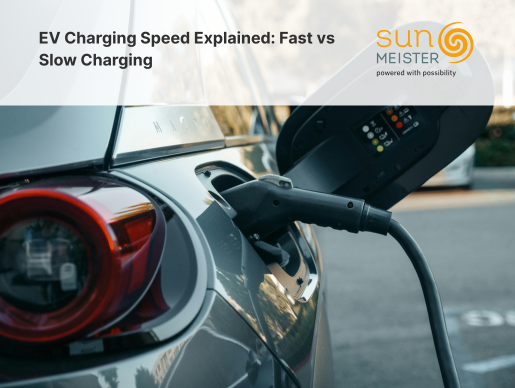As electric vehicles become mainstream in India, one of the most common questions new EV owners ask is – How fast can I charge my car at home?
The answer depends on the type of charger you use, your power connection, and your vehicle’s onboard charging capability. Understanding the difference between slow and fast charging helps you choose the right solution for your home or business.
At Sunmeister, we help customers across Chennai, Bangalore, Hyderabad, Kerala, and Mumbai install safe, efficient, and future-ready Victron EV charging systems tailored to their needs.
1. The Basics of EV Charging
Electric vehicles store energy in a battery, which is charged by transferring power from an external source (like the grid or solar panels). The charging speed depends on:
The charger’s power output (in kW)
The car’s onboard charger capacity
The type of electrical connection (single-phase or three-phase)
The cable and plug standard (Type 2 is most common in India)
2. Slow Charging – Safe and Convenient for Everyday Use
Slow charging, also known as Level 1 or standard AC charging, uses a single-phase connection, typically 230V.
Typical output: 2.3 to 3.3 kW
Charging time: 8–10 hours for a full charge (depending on vehicle battery size)
Ideal for:
Overnight home charging
Users with smaller EV batteries (like Tata Nexon EV, MG Comet, or compact EVs)
Daily commuters with predictable driving patterns
Advantages:
Easy to install, cost-effective
Gentle on battery life due to slow, steady charging
Can use existing home circuits (with professional verification)
Disadvantages:
Long charging time
Not suitable for large battery EVs or shared setups
With a Victron Single-Phase EV Charging Station (7.3 kW), you can enjoy safe, smart, and reliable slow-to-moderate charging while integrating solar power for eco-friendly operation.
3. Fast Charging – When You Need Power Quickly
Fast charging uses higher power output, usually three-phase AC (400V) or DC chargers.
Typical output: 7.4 kW to 22 kW (AC)
Charging time: 2–4 hours for most cars
Ideal for:
Large EVs like BYD Atto 3, MG ZS EV, Hyundai Kona, and fleet vehicles
Homes or commercial setups with three-phase power
Users needing quick turnaround between trips
Advantages:
Much shorter charging times
More energy in less time, ideal for high-mileage users
Compatible with future EV models that support faster AC charging
Disadvantages:
Requires stronger electrical infrastructure
Slightly higher installation cost
Victron’s Three-Phase EV Charging Station (up to 22 kW) is designed for these setups. It dynamically balances load, integrates with solar systems, and can be monitored remotely using VictronConnect or VRM portal.
4. Smart vs Basic Charging
A smart charger allows you to monitor, control, and optimize your charging sessions – something a basic charger cannot do.
Smart features in Victron chargers include:
Remote control and monitoring
Dynamic load balancing (avoids overloads)
Prioritizing solar power when available
Adjustable current limits to match your grid or solar capacity
Integration with Victron inverters and batteries for complete home energy management
Sunmeister configures these systems so your EV automatically charges using solar surplus during the day or off-peak electricity at night, lowering your total energy cost.
5. Which One Should You Choose?
| Parameter | Slow Charging | Fast Charging |
|---|---|---|
| Power Output | 2.3–7.3 kW | 7.4–22 kW |
| Charging Time | 6–10 hours | 2–4 hours |
| Best For | Daily home charging, smaller EVs | Quick charging, large EVs, shared setups |
| Power Supply | Single-phase | Three-phase |
| Integration with Solar | Yes (through smart chargers) | Yes (with load balancing) |
| Example Victron Model | Victron EV Charging Station 7.3 kW | Victron EV Charging Station 22 kW |
Tip: Even if your current EV supports only slow charging, investing in a fast, three-phase Victron charger prepares you for future EVs and higher power demands.
6. Cost Overview in India
| Type | Approx. Equipment + Installation Cost |
|---|---|
| Slow/Single-Phase Charger (up to 7.3 kW) | ₹45,000 – ₹80,000 |
| Fast/Three-Phase Charger (up to 22 kW) | ₹80,000 – ₹1,30,000 |
Sunmeister provides end-to-end installation, including site survey, wiring, safety accessories, and solar integration.
7. Why Choose Sunmeister for EV Charging Solutions
Sunmeister is more than an installer – we’re your energy solutions partner. We design custom EV charging setups that integrate solar power, hybrid inverters, and remote monitoring for maximum performance and savings.
What we offer:
Site assessment and load analysis
Installation of Victron EV chargers and accessories
Solar and battery integration for clean charging
Monitoring setup via VictronConnect or VRM
After-sales service and maintenance
Whether you’re installing your first home charger or upgrading to a fast, solar-ready system, Sunmeister ensures a safe, efficient, and future-proof setup.
The difference between fast and slow EV charging comes down to speed, power, and your home’s electrical capacity. Both have their advantages – but choosing the right one depends on your vehicle, driving habits, and power setup.
With Victron’s advanced EV chargers and Sunmeister’s technical expertise, you get a system that’s reliable today and ready for tomorrow.
If you’re planning to install an EV charger in your home or integrate it with solar, contact Sunmeister Experts for a consultation.

